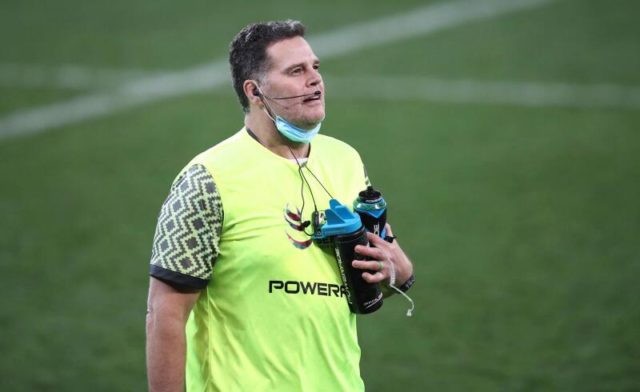In what can be seen as a direct shot at Rassie Erasmus, World Rugby have approved a new global trial on ‘limiting the opportunity for non-playing personnel to enter the field of play during a match’ from July 1.
Cape Town – In what can be seen as a direct shot at Rassie Erasmus, World Rugby have approved a new global trial on “limiting the opportunity for non-playing personnel to enter the field of play during a match” from July 1.
On what will apply to all matches around the globe, World Rugby said on Tuesday that the trial “aims to improve the flow of matches by reducing unnecessary stoppages without compromising welfare”.
But they also stated specifically that in terms of the additional team personnel, the two dedicated water carriers “cannot be a Director of Rugby or Head Coach”.
ALSO READ: Rassie’s waterboy days are officially over
This comes after former Bok coach Erasmus, who is now the director of rugby at SA Rugby, donned his water carrier bib and earpiece during the British and Irish Lions tour of South Africa last year, which irritated opposition head coach Warren Gatland.
Erasmus was criticised for ‘coaching’ the Boks on the pitch and relaying messages to and from head coach Jacques Nienaber.
The former loose forward was also in the role for last November’s Test against Scotland, but has been banned by World Rugby until October this year for all match-day activities following his controversial video about Australian referee Nic Berry’s performance during the first Lions Test at the Cape Town Stadium.
ALSO READ: Rassie Erasmus, SA Rugby in hot water over ref video
On the trial regulations issued by World Rugby on Tuesday, the governing body added that medics can only provide water to players they are treating, and cannot field or touch a ball when it is live in play. If they do, the opposing team will be awarded a penalty.
Players themselves may access water behind the dead-ball line or from within their technical zone on the side of the pitch at any time.
For the additional personnel, apart from the water carrier regulations mentioned earlier, World Rugby added that water carriers will only enter the field twice per half at times agreed with the match officials, and that can only be during a stoppage in play or when a try has been scored.
Also, whoever brings on the kicking tee may only carry one water bottle for the kicker’s use only, and should remain in the team technical zone at all times.
ALSO READ: Watch out Eddie Jones, Boks will be even more motivated after Rassie Erasmus’ punishment
Assistant coaches and medics often bark out “advice” to the match officials during a game – appealing for a penalty – but that won’t be allowed any longer and will result in a penalty, with World Rugby stating that medics can only address the referee in respect of treating a player.
“The trial follows an extensive review by the international federation of the current elite rugby environment, including research into player hydration needs, and increasing disruption to play caused by multiple water carriers entering the field of play every time there is a stoppage,” World Rugby said.
“The new trial for non-medical personnel sets out a revised protocol for when medics and water-carriers, can access the field of play, limiting the ability to interact with the match officials, and providing a sanctioning framework for any action that that either interferes with play or is against the values of the sport.
“The aim of the trial is to improve the flow of the game, reduce the opportunity for potential interference, enhance the spectacle for fans and support match management by match officials.”
Mark Harrington, the chief player welfare and rugby services officer at World Rugby, said “Helping the game to flow better whilst not compromising on the welfare of players is a key aim of these trials.
“We’re taking concrete action to improve the flow of rugby matches, this will be the first time teams on the field of play could be sanctioned by the actions of those not directly involved in the contest.
“We’ve received feedback from across the game that the number of people who aren’t players, interrupting the flow of the game was getting out of hand.
“But we needed to tackle the issue without impacting on the welfare of players and providing them with everything needed to perform at the highest level.
“I’d like to thank all our partners and stakeholders who have helped us strike the right balance with this new trial.”
@ashfakmohamed








